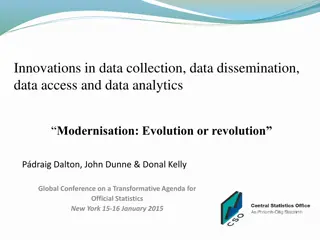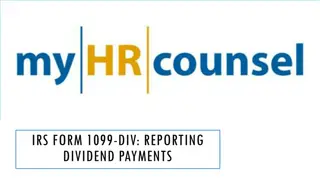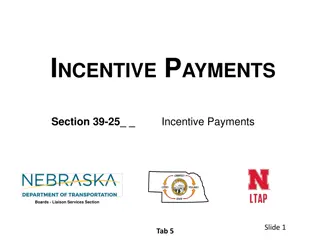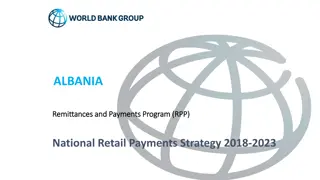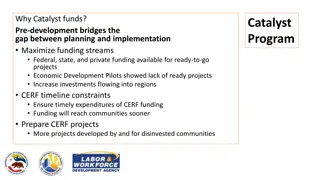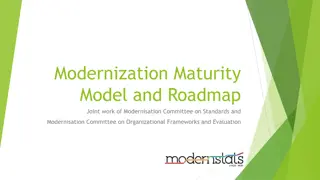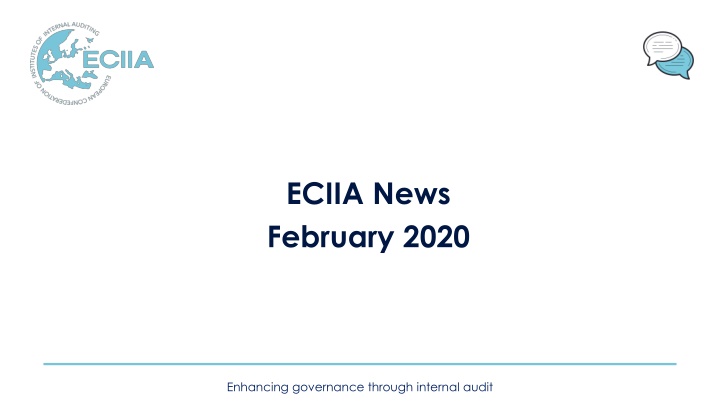
Government as a Catalyst to the Modernisation of Payments
Insights from the BASA Payments Modernisation Programme on how government can drive the modernisation of payments through digital initiatives, data analytics, and risk management strategies. Discover the pillars of a digital economy and the role of state-owned data in efficient funds deployment. Uncover data use cases and applications in identifying patterns, risk scoring, and machine learning for fraud detection.
Download Presentation

Please find below an Image/Link to download the presentation.
The content on the website is provided AS IS for your information and personal use only. It may not be sold, licensed, or shared on other websites without obtaining consent from the author. If you encounter any issues during the download, it is possible that the publisher has removed the file from their server.
You are allowed to download the files provided on this website for personal or commercial use, subject to the condition that they are used lawfully. All files are the property of their respective owners.
The content on the website is provided AS IS for your information and personal use only. It may not be sold, licensed, or shared on other websites without obtaining consent from the author.
E N D
Presentation Transcript
ECIIA News February 2020 Enhancing governance through internal audit Enhancing governance through internal audit www.eciia.eu
ECIIA News General Insurance Banking Communication Enhancing governance through internal audit Enhancing governance through internal audit www.eciia.eu
EC 2020 Workprogramme The European Commission adopted its 2020 Work Programme. It is divided into six headlines addressing the main objectives of the Von der Leyen Commission including (i) A European Green Deal (ii) A Europe fit for the digital age (iii) An economy that works for people (iv) A stronger Europe in the world (v) Promoting our European way of life (vi) A new push for European democracy. To ensure mainstreamed sustainable investments across the financial system, the EC announced: a Renewed Sustainable Finance Strategy which will aim at redirecting private capital flows to green investments. Embedding a culture of sustainable corporate governance in private sector firms will be equally important, a review of the Non-Financial Reporting Directive (Q4 2020). Enhancing governance through internal audit Enhancing governance through internal audit www.eciia.eu
EC 2020 Workprogramme for us a Renewed Sustainable Finance Strategy which will aim at redirecting private capital flows to green investments. Embedding a culture of sustainable corporate governance in private sector firms will be equally important, a review of the Non-Financial Reporting Directive (Q4 2020). a new Action Plan on Anti-Money Laundering which will seek to improve the supervisory system and improve the enforcement of the rules (non-legislative, Q1 2020); review of the Capital Requirements legislation (legislative, Q2 2020). a new Action Plan on Artificial Intelligence (legislative, Q1 2020) the introduction of multiannual programming between the three EU institutions (European Commission, European Parliament and Council of the EU). Enhancing governance through internal audit Enhancing governance through internal audit www.eciia.eu
Sustainable Finance Review DG FISMA will be working on the review of the Action Plan on sustainable finance. A public consultation will be issued to have people out forward to do more to create a more in- depth/detailed strategy in Q3 of 2020. Areas to focus on: How to incorporate climate and environmental risks into risk management of financial firms; How to incorporate those aspects into governance of companies; How the financial sector can help other parts of the economy to manage; environmental risk, such as how insurers can contribute and help with environmental disasters; DATA how to have enough data non-financial disclosures in relation to climate disclosures; International cooperation is key. Europe wants to lead but cannot do this alone. Taxonomy is complex but important as a lot of funding is necessary. Private and retail investors are also needed to help; Labelling what is a green project? A green bond? A green mortgage? In early March, the Technical Expert Group on Sustainable Finance will publish its final report on an EU Taxonomy as well as further user guidance in relation to its recommendations for an EU Green Bond Standard. To accompany these reports and provide a venue for an open exchange with stakeholders, the European Commission will organise a stakeholder dialogue on 12 March 2020. Enhancing governance through internal audit Enhancing governance through internal audit www.eciia.eu
NFR Directive The European Commission is also consulting stakeholders on its road map related to non-financial reporting. Deadline: 27 February 2020. The reporting requirements in the NFRD are not detailed, are difficult to enforce, leave a lot of discretion to reporting companies, and do not apply to some companies from which users say they need information. Big pressure to create environment accounting and to define compulsory Reporting Standards Enhancing governance through internal audit Enhancing governance through internal audit www.eciia.eu
NFR Consultation Accountancy Europe has issued a paper on interconnected standard setting for corporate reporting. They introduce nine criteria and apply them to four approaches. The paper is open for comments by 31 March 2020. Enhancing governance through internal audit Enhancing governance through internal audit www.eciia.eu
Anti Money Laundering European Commission published on Wednesday 12 February the roadmap to prepare its Action Plan on the fight against money laundering and terrorist financing, which is due to be unveiled on 25 March. Interested parties have until 11 March to submit their comments. The action plan will take the form of a political communication which will aim to address the shortcomings identified by the Commission in its July 2019 reports. The Commission services will hold meetings with stakeholders to gather their opinions. No other public consultation is planned. However, the Communication will be the basis for extensive consultation in view of presenting new policy initiatives in early 2021. Enhancing governance through internal audit Enhancing governance through internal audit www.eciia.eu
Artificial Intelligence The European Commission Directorate General for Justice and Consumers entrusted a research consortium led by EY to carry out a study on the relevance and impact of artificial intelligence for Company Law & Corporate Governance. The study should contribute to a better understanding of the actual and potential use of AI by companies, directors, shareholders, creditors or public authorities, public officials or other persons or bodies in order to perform certain company law tasks, identify possible opportunities and risks, regulatory gaps (if any), and analyse how these could be best addressed. In the context of this study, the contractors have deployed web-surveys to collect evidence and views from a broad range of stakeholders. The deadline for taking the survey is 6 March 2020 Enhancing governance through internal audit Enhancing governance through internal audit www.eciia.eu
EIOPAs Key Priorities for 2020: - Digitalisation & Cyber: EIOPA will focus on the impact of new technology enabled business models and the use of the new technologies for supervisory purposes. Furthering the Sustainable Finance agenda: EIOPA has a sustainable finance action plan and will further this work and contribute to ensure the reflection of ESG factors in relevant regulation as well as in its risk assessments. EIOPA aims to lead convergence towards high-quality prudential supervision throughout the EU: This will include nation-wide strategic supervisory priorities and the development of cross-border cooperation platforms to enhance effectiveness. - - Enhancing governance through internal audit Enhancing governance through internal audit www.eciia.eu
EIOPAs Key Priorities for 2020 (2): - Driving forward conduct of business regulation and supervision: EIOPA will enhance the information available to supervisors on consumer trends and retail risk indicators. Strengthening the financial stability of the insurance and occupational pensions sectors: EIOPA aims to develop common methodologies for identifying financial institutions to be included in WU-wide assessments for the effect of environmental risks on those financial institutions. Delivering EIOPA s mandate effectively and efficiently: Maintaining the commitment to ensure transparency and accountability. EIOPA also plans to continue to undertake initiatives to make regulation for both insurance and pensions sectors available on the website. - - Enhancing governance through internal audit Enhancing governance through internal audit www.eciia.eu
EIOPAs Key Priorities for 2020 (3): EIOPA has released its strategy for cyber underwriting and supervisory technology. The objective is to contribute to the building of a strong and reliable cyber insurance market. The conditions that are essential for resilient cyber insurance market are: - Appropriate cyber underwriting and risk management practices and corresponding promotion of such practices - Adequate assessment and mitigation tools to address potential systemic and extreme risk - A mutual understanding between policyholders and insurers of contractual definitions, conditions and terms - An adequate level and quality of data on cyber incidents available at a European level. Enhancing governance through internal audit Enhancing governance through internal audit www.eciia.eu
ECIIA Insurance Committee plan Follow up on EIOPA Solvency Review consultation New position papers: -Outsourcing (in parallel with Banking Committee paper): draft to be discussed at next meeting -the impact of ESG on internal audit (based on 17 objectives of Paris framework): concept to be discussed -the use of data science by internal audit in the insurance business: concept to be discussed Enhancing governance through internal audit Enhancing governance through internal audit www.eciia.eu
ECBs Priorities for 2020: - ECB will be ensuring that the improvements achieved by the Targeted Review of Internal Models (TRIM) should be incorporated into banks ongoing processes and its supervisory approaches. ECB will continue to focus on ensuring that banks are taking appropriate steps to understand, monitor and mitigate their trading risks and asset valuations. ECB announces that on-site missions will focus on trading and market risk aspects. The coming years are also likely to see supervisors paying more attention to the decision-making and controls that underpin asset valuations, - which could put a strain on banks data aggregation and reporting capabilities. ECB will also be taking a closer interest in strategic planning. - - - Enhancing governance through internal audit Enhancing governance through internal audit www.eciia.eu
ECBs Priorities for 2020 (2): - ECB will also be making more frequent use of supervisory initiatives aimed at strengthening cyber resilience, not only covering supervised banks but also payment systems and financial market infrastructures. ECB plans to use its on-site inspections to also assess the quality of the Internal Capital Adequacy Assessments (ICAAP) and Internal Liquidity Adequacy Assessments (ILAAP) of SSM banks in 2020, which should give banks more incentive to address the serious shortcomings found by inspections during 2018. ECB will also be implementing an approach for the determination of Pillar 2 own funds requirements on a risk-based basis during the individual banks assessments. - - Enhancing governance through internal audit Enhancing governance through internal audit www.eciia.eu
ECBs Priorities for 2020 (3): - ECB believes that consolidation has a vital role in boosting the underlying profitability of European banks, notably the beneficial effects that greater concentration has on banks efficiency and thus, on the level of investment in technology and digitalisation. ECB also views more cross-border mergers as a vote of confidence in the Banking Union, and thus, will pay increasing attention to the threat that banks face and to the future-proofing of their business models. ECB will be increasingly interested in the management of non- financial risks with a growing focus on banks ability to manage diverse non-financial risks, from cloud computing to climate change. - - Enhancing governance through internal audit Enhancing governance through internal audit www.eciia.eu
EBAs Priorities for 2020: - EBA s incoming Guidelines on loan origination and monitoring aim to ensure that new loans are high quality, not only at origination but throughout their lifetimes. The guidelines apply a range of new requirements to banks governance, loan origination procedure, pricing, collateral valuation and monitoring activities. These requests mean that the demand on bank s data, IT systems, governance and internal processes are increasing at every stage of the credit process. It is crucial for banks to have data infrastructure in order to collect, maintain, identify and report all relevant credit risk information. EBA s guidelines also focus on ICT and security risk management, as well as on-site inspections. - - Enhancing governance through internal audit Enhancing governance through internal audit www.eciia.eu
EBAs Priorities for 2020 (2): - EBA s guidelines on internal governance require banks to clearly define the roles and responsibilities of key risk control functions. This will help identify gaps in the three lines of defence model which is increasingly seen as an obligatory standard for all business models. EBA will also be focusing on making anti-money laundering a real priority for Europe, by leading the work around the completion of the European Council Action Plan on AML. EBA will also be reviewing the effectiveness of the approaches to the AML supervision of banks used by NCAs. - The approaches taken by both the ECB and EBA are becoming more forward-looking and more focused on horizontal benchmarking. Enhancing governance through internal audit Enhancing governance through internal audit www.eciia.eu
ECIIA Banking Committee plan Follow up on EBA Review consultations Meeting with ECB New position papers proposals to be discussed at next Committee: -Assessment of internal audit function -The management of self-raised issues -The audit of cloud services -The r le of IA in the business model risks -The assessment of the resources required (with benchmarking) Enhancing governance through internal audit Enhancing governance through internal audit www.eciia.eu
ECIIA Public Sector plan Survey on NFR with EUROSAI Event with EUROSAI on NFR in Brussels in June (17 or 18) Standards for IA in the public sector (in discussion) Existence of IA function (in discussion) Enhancing governance through internal audit Enhancing governance through internal audit www.eciia.eu
To be informed Follow us: @EciiaInfo www.eciia.eu info@eciia.eu News from ECIIA Enhancing governance through internal audit Enhancing governance through internal audit www.eciia.eu









